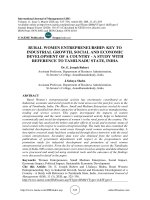Economic growth and economic development 266
Bạn đang xem bản rút gọn của tài liệu. Xem và tải ngay bản đầy đủ của tài liệu tại đây (125.44 KB, 1 trang )
Introduction to Modern Economic Growth
Exercise 5.3. Prove Theorem 5.2.
Exercise 5.4. Prove Theorem 5.3 when there is also production.
Exercise 5.5. * Generalize Theorem 5.3 to an economy with a continuum of commodities.
Exercise 5.6.
(1) Derive the utility maximizing demands for consumers in
Example 5.1 and show that the resulting indirect utility function for each
consumer is given by (5.5).
(2) Show that maximization of (5.6) leads to the indirect utility function corresponding to the representative household.
¢ σ−1
P ¡ i
i
σ
−
ξ
. Repeat the same
x
(3) Now suppose that U i (xi1 , ..., xiN ) = N
j
j
j=1
computations and verify that the resulting indirect utility function is homogeneous of degree 0 in p and y, but does not satisfy the Gorman form.
Show, however, that a monotonic transformation of the indirect utility function satisfies the Gorman form. Is this sufficient to ensure that the economy
admits a representative household?
Exercise 5.7. Construct a continuous-time version of the model with finite lives
and random death. In particular suppose that an individual faces a constant (Poisson) flow rate of death equal to ν > 0 and has a true discount factor equal to ρ.
Show that this individual will behave as if he is infinitely lived with an effective
discount factor of ρ + ν.
Exercise 5.8.
(1) Will dynastic preferences as those discussed in Section 5.2
lead to infinite-horizon maximization if the instantaneous utility function
of future generations are different (i.e., ut (·) potentially different for each
generation t)?
(2) How would the results be different if an individual cares about the continuation utility of his offspring with discount factor β, but also cares about the
continuation utility of the offspring of his offspring with a smaller discount
factor δ?
Exercise 5.9. Prove Theorem 5.8.
Exercise 5.10. Consider the sequential trading model discussed above and suppose
now that individuals can trade bonds at time t that deliver one unit of good 0 at
time t0 . Denote the price of such bonds by qt,t0 .
252









